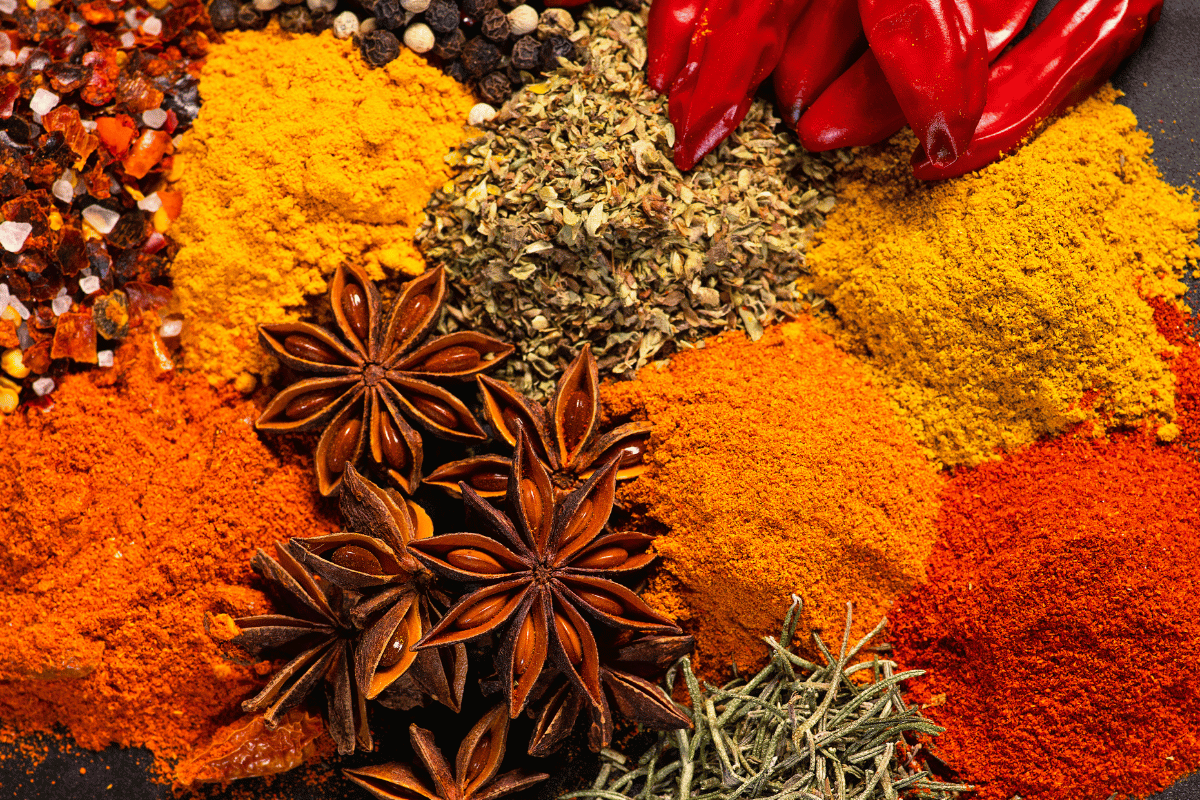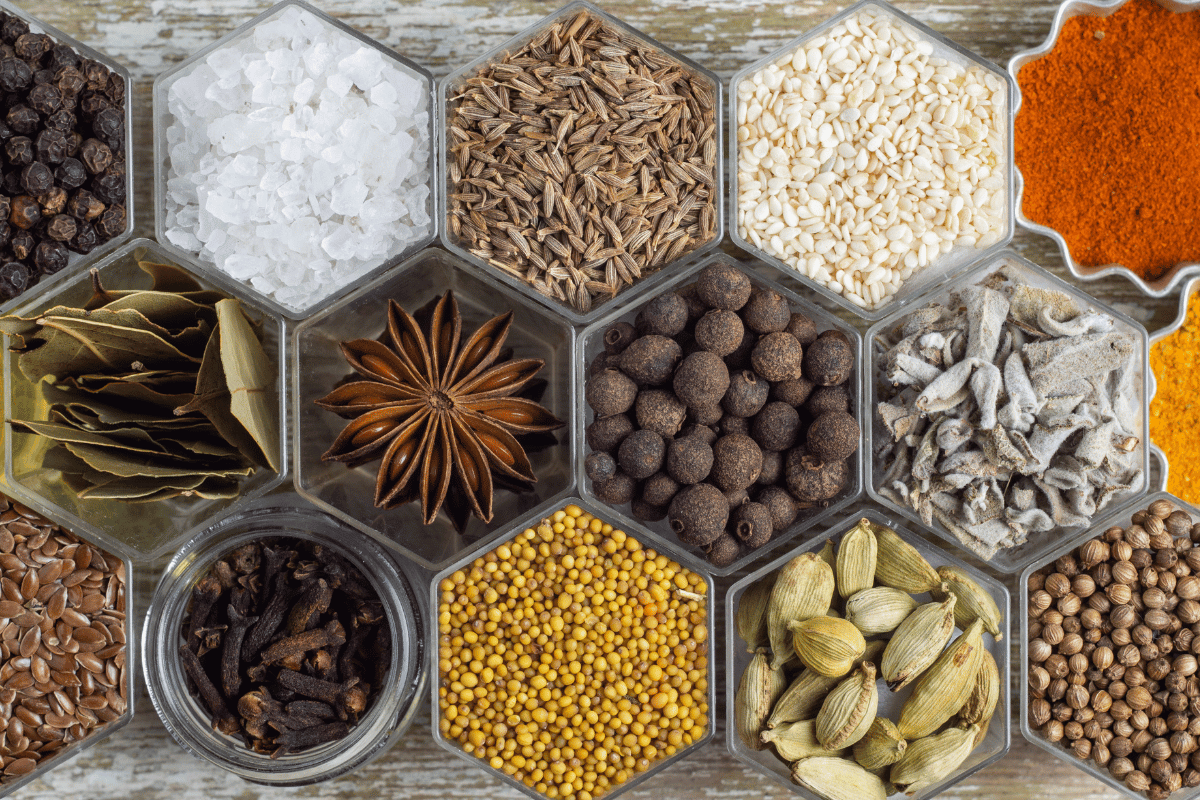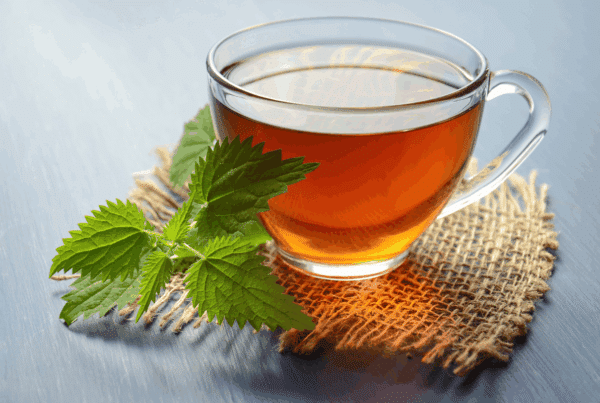In this blog, we will embark on an exciting journey with different spices, exploring their not only delicious, but also remarkable health benefits.
We will discover how ordinary spices, which we often find in our kitchen, can have a strong effect on our body and contribute to our general well-being.
We will learn how turmeric, a spice from India, can help reduce inflammation and strengthen the immune system. Ginger will guide us through its anti-inflammatory and antioxidant properties, while cinnamon will help regulate blood sugar levels. We will get to know basil, which is not only delicious, but also rich in antioxidants, and many other spices whose health benefits are often not sufficiently researched.
Get ready for information to help you better understand how everyday spices can improve your diet and contribute to your health and well-being. Through a series of passages, recipes and useful tips, we will learn how to harness the power of aromatic wizards in our kitchen and transform our lives for the better. Welcome to this exciting journey into the world of spices and health!
Spices for health
Spices are more than just ingredients that enhance the taste of our dishes; they are also valuable allies in preserving our health and well-being. In various cuisines around the world, spices have been used for thousands of years for their medicinal properties and nutritional value. A key feature that makes spices so valuable to our health is their ability to provide antioxidants, anti-inflammatory substances and other beneficial nutrients.
The antioxidant power of the spice is particularly important because it helps protect cells from free radical damage, which can contribute to the prevention of various diseases, including heart disease, cancer and aging. Spices like turmeric, basil, oregano and cinnamon are rich in antioxidants that provide this protection.
The anti-inflammatory properties of spices play a key role in reducing inflammation in the body, which can be the root of many chronic diseases. Ginger, garlic, and paprika are just some of the spices known for their anti-inflammatory effects.
In addition, spices often contain vitamins, minerals and other nutrients that support overall health. For example, many spices are rich in vitamin C, vitamin K, magnesium and other substances that are crucial for the health of bones, the immune system and other aspects of our body.
Finally, spices are not just for seasoning food; they are also powerful tools for improving our health and general well-being. Using a variety of spices in our diet can help balance our bodies and help us live happier and healthier lives.

Spice mixes for different diets
Spice blends are a great way to add flavor and texture to your dishes, and can be especially helpful for those following certain diets, such as keto, paleo, or vegetarian/vegan diets. Here's how certain spice blends can help people on these diets:
For the keto diet
The keto diet is based on low carbohydrate intake and high fat intake. Spice blends that contain spices like black pepper, cinnamon, ginger, and turmeric can be great additions to keto meals. These spices do not contain a lot of carbohydrates, but they provide a rich flavor and have anti-inflammatory properties. For example, a mixture of turmeric and black pepper can add color and flavor to dishes, and can also help keep inflammation levels low, which is important on the keto diet.
For the paleo diet
The Paleo diet is based on foods similar to those consumed by humans during the hunter-gatherer era. Seasoning blends that focus on natural ingredients, such as garlic, black pepper, oregano, and thyme, can be used to enhance the flavor of meat, fish, and vegetables. These blends provide a natural and rich flavor to meals, without the need for artificial additives or preservatives.
For a vegetarian/vegan diet
Vegetarian and vegan diets are based on a plant-based diet, so using spice blends is key to enriching the flavor of the meal. Blends containing spices such as cumin, coriander, smoked paprika and turmeric can add depth and variety of flavor to vegetarian and vegan dishes. For example, a mixture of cumin and coriander can enrich the taste of vegetables and legumes, while smoked paprika can bring an interesting aroma to dishes without meat.
By combining the right spice blends with a specific diet, you can enjoy delicious meals that are in line with your dietary goals and restrictions. Spices are a great way to add variety and satisfaction to your diet, no matter what type of diet you follow.
Spices to improve the taste of healthy dishes
Improving the taste of healthy foods can be key to maintaining satisfaction and consistency in healthy eating. Spices are there to add variety and depth of flavor to meals, and when used correctly can transform even the simplest of ingredients. Here are some tips on how to use spices to enhance the taste of healthy dishes:
Salads
Salads can often be monotonous, but spices can change all that. Instead of plain olive oil and vinegar, add some fresh lemon juice and grated lemon peel for a refreshing and citrusy taste. Also, a mixture of parsley, mint and basil can add aromatic notes to the salad. Spices like toasted sesame or sunflower seeds also provide a crunchy texture and add richness.
Roasted vegetables
Roasted vegetables can be delicious without adding too much fat. Seasoning blends such as a blend of olive oil, garlic, rosemary, and thyme can enhance the flavor of roasted vegetables. Also, adding a pinch of sea salt and black pepper to the vegetables before roasting can bring out the natural flavors.
Lean proteins
Lean proteins like chicken, fish and tofu often lack intense flavor. Spice blends with spices such as cumin, cayenne, chili and turmeric can add sharpness and spiciness. Marinating proteins in spice blends before cooking or baking can also help the flavors absorb more deeply.
Supplements and sauces
You can enhance the umami taste by adding soy sauce, roasted black beluga or miso paste. These ingredients add depth of flavor to dishes. Additionally, fresh or dried dill can add a pleasant freshness to dishes.
Experimentation
Don't be afraid to experiment with different spices and mixes. For example, spices like cumin, coriander and fennel are often used in Asian cuisine and can add an intriguing flavor. Adjust the spices to your personal preferences and try new combinations.
Using a variety of spices in a healthy diet will not only improve the taste of the food, but also inspire you to explore new recipes and enjoy a variety of foods. Spices are the key to transforming healthy dishes into delicious and satisfying meals.

Spice combinations for specific goals
Spice combinations can play a key role in achieving various health goals. Understanding how certain spice combinations affect the body can help you better utilize their potential to improve your health. Here are some examples of spice combinations to achieve specific goals:
1. Improving digestion:
Ginger and mint mixture: Ginger is known for its anti-inflammatory and anti-emetic properties, while mint can help soothe indigestion. By combining these two spices, you can ease digestion and reduce bloating.
Cumin, coriander and fennel: These spices are often used in Ayurvedic medicine to improve digestion. Cumin helps stimulate the secretion of digestive juices, while coriander and fennel help reduce bloating and gas.
2. Reducing inflammation:
Turmeric, black pepper and olive oil: Turmeric is known for its powerful anti-inflammatory properties, but it is better absorbed in combination with black pepper and a little olive oil. This combination can help reduce inflammation in the body.
Garlic, ginger and olive oil: Garlic and ginger have anti-inflammatory properties, and the addition of olive oil helps in better absorption of their nutrients.
3. Increase energy levels:
Cinnamon, cardamom and black tea: This is a popular combination in Indian chai tea. Cinnamon and cardamom add natural sweetness and flavor, while black tea contains caffeine for energy.
Lemon, mint and ginger: This combination is often used as a refreshing drink that can increase energy. Lemon provides vitamin C, mint helps maintain alertness, while ginger provides a natural stimulant.
It is important to note that each person may react differently to spices, and it is best to experiment and adjust spices to your needs and preferences.
Also, it is important to observe moderation and not use too many spices to avoid unpleasant side effects.
Through the proper use of spice combinations, you can target your health goals, improve body function, and feel better in your everyday life.
Spices for drink lovers
Spices aren't just reserved for culinary adventures; they can add magic and variety to your favorite drinks! Here's how spices can be used in teas, cocktails and tonics, with a bit of humor and fun.
1. Tea with a twist
Spices can liven up your cup of tea. Adding cardamom and fennel to black tea can give it an Indian charm and richness of flavor. Also, a mixture of ginger, lemon and honey in warm water can be a refreshing and soothing drink for cold days.
2. Cocktails with a spicy twist
Spices are the secret ingredient in many cocktails. By adding cloves and cinnamon to the punch, you create a delicious and aromatic combination. Also, using fresh basil in mojitos or mint in pina colada cocktails can give extra freshness and flavor to drinks. Fun fact: Mint is often used in cocktails because of its ability to stimulate the sense of taste.
3. Tonic for better health
Spices can also be used in healthy tonic drinks. Make a refreshing tonic with fresh cucumber, ginger and lemon, which can help hydrate and detoxify the body. Fun fact: Ginger is traditionally used as a remedy for nausea and indigestion.
4. Alcoholic adventure
Spices are a key component of many famous alcoholic beverages. For example, juniper berries are the main ingredient in gin, while cardamom and coriander are often used in making gin and various liqueurs.
5. Exotic combination
Spices from exotic corners of the world are often used to create intriguing drinks. Add chili spice to add charm to the margarita. Fun fact: Chili often has a reputation as an aphrodisiac.
Remember, adding spices to drinks is not only for taste, but also for aroma and experience. Experiment with spices to create your own unique and delicious drinks. Healthy or fun, spices are the secret to adding a special charm to your glass. Cheers!
How to properly store and preserve spices
Proper storage of spices is key to preserving their freshness, flavor and nutritional value. Here are some tips on how to properly store and preserve spices:
Hermetically sealed containers: Store spices in airtight containers, such as glass jars with tight-fitting lids or plastic boxes. This will prevent moisture, light and air from entering, which can cause the spice to lose flavor and quality.
A cool and dark place: Store spices in a cool, dark place, away from direct sunlight. Light and heat can cause spices to oxidize, which can lead to loss of flavor and color.
Checking the expiration date: Regularly check the expiration date on the spice packaging. Although spices do not become toxic after the expiration date, they will lose their potency and flavor. Checking the date will help you use fresh spices.
Ground spices vs. whole grains: Whole grains of spices retain their freshness longer than ground spices. If possible, buy whole beans and grind them just before use. Also, whole grains often have a more intense flavor.
Wipe away moisture: If condensation forms inside the spice container, wipe it off before closing the container. Moisture can cause lumps to form and spices to spoil.
Clean spoon: Never use a wet or dirty spoon to scoop spices from the container. Water can cause lumps to form in spices. Use a dry and clean spoon.
When it comes to buying spices, buying in the package specified by the manufacturer is often a better choice than buying spices in bulk and measured by health foods for several reasons:
Freshness: Packaged spices are usually hermetically sealed, which means they are less exposed to air, light and moisture. This helps preserve the freshness and aroma of the spices.
Expiration date: By buying spices in packages, you can easily check the expiration date, which helps you to be sure that the spices are still potent.
Hygiene: Spices in bulk are often touched by different people and can be less hygienic. By buying spices in their original packaging, you reduce the risk of contamination.
Properly storing and buying spices in packages will help you enjoy fresh and delicious spices in your kitchen, adding a richness of flavor to your dishes.

Health benefits of spices
And now that we have gone through all the interesting things related to spices, their use, proper storage and innovative ideas for using them, we move on to probably the most important part of this text - the health benefits of different types of spices.
1. The Power of Turmeric: The Anti-Inflammatory Miracle Spice
Turmeric, a spice known for its intense yellow color and rich taste, hides a veritable treasure trove of health benefits, all thanks to a compound called curcumin. Curcumin is a natural antioxidant and anti-inflammatory agent found in turmeric, the root of the Curcuma longa plant, which is often used in Asian cuisine.
This golden spice powerhouse has been used in traditional medicine for centuries, and is now attracting the attention of scientists around the world for its potential health benefits. Its ability to reduce inflammation in the body is one of curcumin's most prominent properties.
Curcumin works by inhibiting the activity of enzymes and molecules that are directly involved in the inflammation process. This means that curcumin may be useful in alleviating the symptoms of inflammatory conditions such as arthritis, inflammatory bowel disease and other autoimmune diseases. It is also being investigated for its potential role in reducing the risk of chronic diseases such as heart disease, diabetes and Alzheimer's disease.
However, it is important to note that curcumin has low bioavailability, meaning it is not well absorbed by the body. To maximize the benefits of curcumin, it is recommended to take supplements that contain piperine, the active component of black pepper, which can help increase the absorption of curcumin.
In conclusion, turmeric and its active ingredient curcumin offer many health benefits, especially in the context of reducing inflammation in the body. Adding turmeric to your diet or taking curcumin supplements can be a step towards improving your overall health and well-being.
2. Cinnamon: A sweet spice with health benefits
Cinnamon, that fragrant spice often used in cakes and drinks, is not only delicious, but also offers significant health benefits, especially when it comes to controlling blood sugar levels.
One of the most important aspects of cinnamon is its ability to improve insulin sensitivity. Insulin is a hormone that is essential for regulating blood sugar levels because it helps cells absorb glucose from the blood.
However, in people with insulin resistance, cells become less sensitive to insulin, which can lead to high blood sugar levels and increase the risk of type 2 diabetes.
Cinnamon works by improving the sensitivity of cells to insulin, which means that cells respond better to this hormone and absorb glucose more efficiently. This can help keep blood sugar levels stable and prevent the large swings that often accompany high-carb meals.
Several studies have confirmed the positive effect of cinnamon on blood sugar levels. However, it is important to note that cinnamon is not a substitute for diabetes treatment and should not be used as the main treatment. Instead, cinnamon can be a beneficial part of a healthy diet and lifestyle for those prone to high blood sugar or at risk of diabetes.
To reap the benefits of cinnamon, simply add it to your diet. You can sprinkle it on your morning porridge, add it to fruit smoothies or use it as a spice in various recipes. Just a few grams of cinnamon a day can provide health benefits in controlling blood sugar levels and contributing to your overall well-being.
3. Ginger for strengthening immunity and reducing stress
Ginger is an extremely beneficial spice that offers numerous health benefits, including boosting the immune system and reducing stress and anxiety.
In terms of immunity, ginger is rich in antioxidants and bioactive compounds, including gingerol, which plays a key role in improving the function of the immune system. Gingerol has anti-inflammatory properties and can help fight infections. Regular consumption of ginger can help the body to cope with colds, flu and other diseases faster.
Also, ginger can have a positive effect on reducing stress and anxiety. The smell of ginger alone can have a calming effect on the nervous system, and its ability to reduce inflammation in the body can indirectly help reduce stress. Also, ginger can help stabilize blood sugar levels, thus preventing oscillations that can cause feelings of nervousness and anxiety.
One way to reap the benefits of ginger is to make ginger tea. Simply chop fresh ginger and pour hot water over it. Add some honey and lemon for taste, and drink this tea throughout the day. In addition, ginger can be added to various dishes and beverages to enjoy its health benefits.
In conclusion, ginger is a powerful spice with numerous health benefits, including supporting the immune system and reducing stress and anxiety. By including ginger in your diet, you can improve your overall well-being and feel better physically and emotionally.
4. Pepper: A spice that stimulates digestion
Pepper is a spice often used in cooking, and it can have significant benefits for digestion and absorption of nutrients. We will focus on the two most famous types of pepper: black and white pepper.
Black pepper is probably the best known and most commonly used form of pepper. It contains a compound known as piperine, which plays a key role in improving digestion.
Piperine helps stimulate the secretion of stomach acids, which can facilitate the process of breaking down food in the stomach. In addition, piperine can improve the absorption of nutrients from food, including vitamins and minerals. Due to these properties, black pepper is often used as an addition to dishes to improve digestion and utilize more nutrients from food.
White pepper, on the other hand, has similar properties to black pepper, but differs in that it does not have a black shell. White pepper is obtained from the inner part of the pepper fruit, and its aroma is slightly milder compared to black pepper. Although less commonly used than black pepper, it can also help stimulate digestion and nutrient absorption.
In conclusion, black and white pepper are spices that can improve the digestive process and absorption of nutrients. Piperine present in black pepper and similar substances in white pepper can facilitate digestion and increase the utilization of nutrients from food. Adding these spices to the diet can contribute to better overall health and utilization of nutrients from food.
5. Oregano: A spice with antimicrobial properties
Oregano is an aromatic spice often used in Mediterranean cuisine, but in addition to adding a rich flavor to dishes, oregano also has significant antimicrobial properties that can contribute to health.
The main component responsible for oregano's antimicrobial activity is oregano oil, which contains compounds such as thymol and carvacrol. These compounds have the ability to inhibit the growth and reproduction of microorganisms such as bacteria, viruses and fungi.
Using oregano in the diet can help prevent food contamination and reduce the risk of food poisoning. Adding oregano to sauces, soups or baking can help prolong the freshness of foods.
In addition, oregano is often used as a natural remedy for various health problems. Oregano's antimicrobial properties can help fight bacterial infections and colds. Its potential role in reducing inflammation and antioxidant protection of the body is also being investigated.
Oregano can be used fresh, dried or in oil form. In any case, it is important to pay attention to moderation, because excessive use of oregano can lead to irritation of the gastrointestinal tract. Enjoying this delicious spice as part of a varied diet can contribute to maintaining health and add a spicy flavor to dishes.
No wonder they use it in almost every dish in Italy!

6. Coriander for detoxification and blood sugar regulation
Coriander, a spice often used in Asian, Mediterranean and Latin American cuisine, not only adds a rich flavor to dishes, but also offers numerous health benefits. Two of the key benefits of coriander are detoxifying the body and regulating blood sugar levels.
Coriander is rich in antioxidants and fiber, which makes it effective for detoxifying the body. Antioxidants help neutralize free radicals and toxins in the body, while fiber supports healthy bowel function and eliminates harmful substances. Using coriander in your diet can help maintain the health of your liver and kidneys, key organs for detoxification.
Regarding the regulation of blood sugar levels, coriander can have a positive effect on stabilizing these levels. Some researchers have suggested that coriander may help increase insulin sensitivity, meaning that cells respond better to insulin and absorb glucose from the blood more efficiently. This property of coriander can be beneficial for people with diabetes or those who want to maintain stable blood sugar levels.
Coriander can be used fresh or dried in a variety of dishes, from salads to curries. Adding this spice to your diet can help maintain your health and well-being, especially in the context of detoxification and blood sugar control. It is very popular in India because of its interesting taste.
7. Nutmeg: The secret of rich taste and aromatic dishes
Nutmeg, with its characteristic rich taste and aroma, is often used in culinary creations to add a special touch to different dishes. However, in addition to its gastronomic value, nutmeg also offers several significant health benefits.
One of the key aspects of nutmeg is its ability to improve digestion. This spice stimulates the secretion of digestive juices and enzymes, which can facilitate the process of breaking down food in the stomach. It can also help reduce bloating and gas, which is often associated with poor digestion.
Nutmeg also contains numerous antioxidants that help neutralize free radicals in the body. Antioxidants play a key role in protecting cells from damage and aging, which can contribute to overall health and vitality.
It is important to note that nutmeg should be used in moderation, as excessive consumption can cause toxic effects. In addition, pregnant women should be especially careful and limit their intake of nutmeg.
In conclusion, nutmeg is not only a tasty spice that enhances the aroma of dishes, but also offers health benefits in terms of improved digestion and antioxidant protection. Using this spice in moderation can add not only a rich flavor to dishes, but also a potentially positive effect on your health.
8. Basil: Fragrant symphony of Italian cuisine
Basil, that fragrant and aromatic spice often associated with Italian cuisine, not only enriches the taste of dishes but also provides numerous health benefits.
The first thing to note is that basil is extremely rich in antioxidants, including vitamins A, C and K, as well as beta-carotene. Antioxidants play a key role in fighting free radicals in the body, reducing oxidative stress and potentially reducing the risk of chronic diseases.
Basil also has anti-inflammatory properties. Its natural compounds, such as eugenol, luteolin and quercetin, can help reduce inflammation in the body. This makes it useful in fighting various inflammatory conditions, including arthritis.
In addition, basil is associated with improved digestion. It helps stimulate the secretion of gastric juices and enzymes, which can facilitate the process of digesting food.
Adding fresh basil to salads, pastas and various dishes not only improves the taste of the meal, but also contributes to the intake of nutrients and health benefits.
It is important to note that fresh basil leaves are more nutritionally valuable than dry ones, so it is recommended to use them fresh whenever possible to maximize its benefits.
9. Cardamom: An exotic spice to discover
Cardamom, an exotic spice that originates from Asian and Middle Eastern cuisines, not only adds a unique aroma and taste to dishes, but also offers a number of health benefits.
The first thing to know is that cardamom contains numerous antioxidants, including compounds such as cineole, limonene, and camphene. These antioxidants play a key role in neutralizing free radicals in the body, which can reduce oxidative stress and the risk of chronic diseases.
Cardamom also has properties that support digestion. It can help reduce bloating, gas and digestive problems. As a natural diuretic, cardamom can help eliminate excess fluid from the body and reduce pressure in the stomach.
This spice also has the potential to reduce inflammation. Compounds in cardamom, such as camphene, may have an anti-inflammatory effect and help relieve inflammatory conditions.
In addition, cardamom is traditionally used to improve oral health. Its antimicrobial properties can help fight the bacteria that cause bad breath, and can also reduce the risk of oral infections.
Cardamom can be used in a variety of forms, including whole grains, ground spice, and oil. By adding cardamom to your diet, you can enjoy not only its unique taste, but also the potential health benefits it provides.
10. Anise: The star of the spice world is born
Anise, a spice known for its characteristic sweet and fragrant aroma, has a long history of use in various cuisines around the world. Besides adding flavor and aroma to dishes, anise also offers several significant health benefits.
One of the key health benefits of anise is its ability to support digestion. Anise is rich in fiber and essential oils, including anethole, which can help stimulate the secretion of digestive juices and enzymes. This eases the process of digesting food and can reduce bloating, gas and stomach discomfort.
Anise is also believed to have antioxidant properties thanks to the presence of antioxidants such as vitamins C and E. Antioxidants help neutralize free radicals in the body, thereby reducing oxidative stress and the risk of chronic diseases.
Anise is often used as a natural remedy for respiratory problems. Inhalation of anise oil can help relieve cough and cold symptoms and is also used to relieve breathing problems.
This spice can be used in a variety of forms, including whole grains, ground anise, and anise oil. By adding anise to your diet or using it in traditional folk remedies, you can take advantage of its health benefits and enjoy its unique taste and aroma.
11. Cumin: The basis of many culinary adventures
Cumin, a spice that is the basis of many culinary traditions around the world, not only enriches the taste of food, but also provides a number of health benefits.
One of the key benefits of cumin is its ability to improve digestion.
Cumin stimulates the secretion of enzymes and digestive juices, which help facilitate the process of breaking down food in the stomach. This can reduce the feeling of bloating, gas and abdominal discomfort. Cumin is also believed to help prevent gastritis and heartburn.
Cumin is also rich in antioxidants, including vitamin C and E, which play a key role in fighting free radicals in the body. This can reduce oxidative stress and the risk of chronic diseases.
In addition, cumin is known for its anti-inflammatory properties. Some researchers suggest that cumin can help reduce inflammation in the body, which can be useful in fighting various inflammatory conditions.
Cumin is often used in a variety of dishes, including curry, chili, and various vegetable and meat dishes. By adding this spice to your diet, you can not only improve the taste of your meals, but also take advantage of its potential health benefits.
12. Clove: A small but powerful spice
Clove, a small spice known for its strong aroma and taste, has a rich history of use in traditional medicine and cooking. Although often used in small amounts due to its intense aroma, cloves also provide several surprising health benefits.
One of the most important benefits of cloves is its ability to relieve pain and inflammation. This spice contains eugenol, a natural compound that has analgesic and anti-inflammatory properties. Therefore, it is often used to relieve toothaches and sore throats, and can also help reduce the symptoms of arthritis.
Cloves also have antiseptic properties and can help fight bacteria and microorganisms. This is why it is used in various natural remedies and toothpastes.
This spice is also associated with improving digestion. Combining cloves with other spices can help reduce bloating and gas, and can also stimulate the appetite.
Cloves can be used in powder or whole cloves and are added to a variety of dishes, from sweet cakes to curries. It is important to note that cloves should be used in moderation, as excessive consumption can be unpleasant. In any case, by adding this spice to your diet, you can not only improve the taste of your dishes, but also take advantage of its potential health benefits.
13. Kim: A spice with a long history and rich taste
Cumin, a spice with a long history and rich taste, has not only culinary value, but also several health benefits that make it particularly attractive.
One of the main benefits of cumin is its ability to improve digestion. Cumin contains natural enzymes that can help break down food and ease the digestive process. It can reduce bloating, gas and stomach discomfort. In addition, cumin is traditionally used to relieve digestive disorders such as heartburn and heartburn.
Cumin also has anti-inflammatory properties. Some researchers suggest that consuming cumin can help reduce inflammation in the body, which is key to preventing various chronic diseases.
This spice also has the potential to help regulate blood sugar. Some studies have shown that cumin can help lower blood sugar levels in people with diabetes or increased insulin resistance.
Cumin can be used in a variety of dishes, including curry, chili, and a variety of vegetable and meat dishes. By adding this spice to your diet, you can not only improve the taste of your meals, but also take advantage of its potential health benefits. It is important to note that cumin is used in moderation, as excessive consumption can cause unpleasant symptoms.
Conclusion
Spices are not only essential ingredients in many delicious dishes around the world, but also precious resources for maintaining our health and well-being. Over the centuries, people have used various spices not only for their aromatic properties, but also for their positive effects on the human body.
The antioxidants, anti-inflammatory properties and other health benefits provided by various spices make them key elements of a balanced diet.
Also, many spices improve digestion, facilitating the breakdown of food and preventing stomach problems such as bloating. Cumin, cumin and anise are just some of the spices that support the digestive system.
In addition, some spices have properties that go beyond the kitchen. For example, cloves are traditionally used to relieve pain and inflammation, while basil is associated with oral health. These natural remedies are part of many folk traditions and alternative medicine.
It is important to note that spices should be used in moderation, as excessive consumption can be harmful. Individual allergies or sensitivities to certain spices should also be taken into account.
By researching and understanding the health benefits of different spices, we can integrate these gifts of nature into our daily diet and take care of our health in a delicious way.
Whether you're experimenting with exotic spices or using familiar ones, the variety of these flavors and benefits make them essential ingredients in our kitchen and our approach to health.
So, the next time you prepare a meal, consider adding different spices to enhance the taste and improve your overall well-being.









